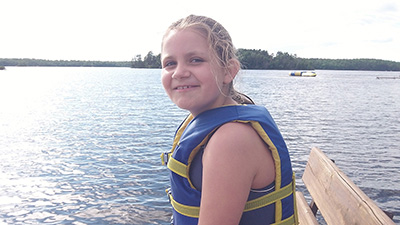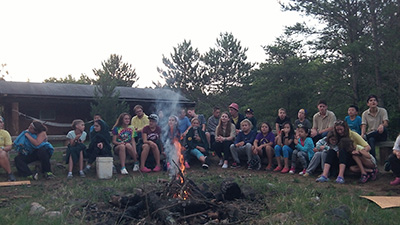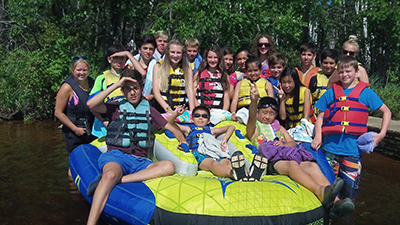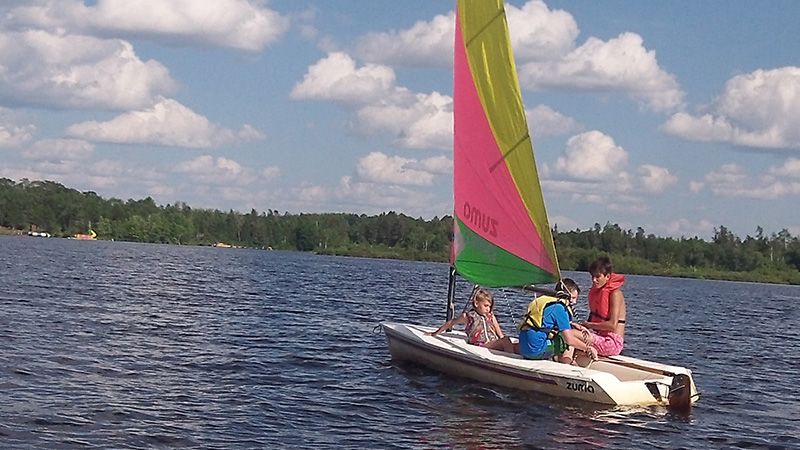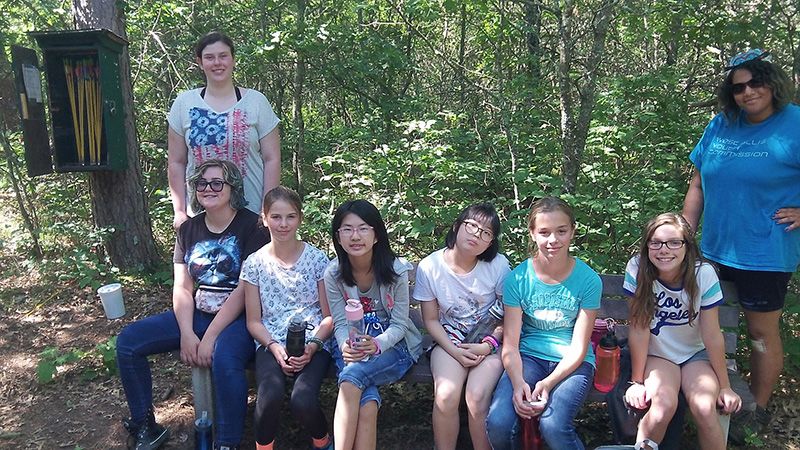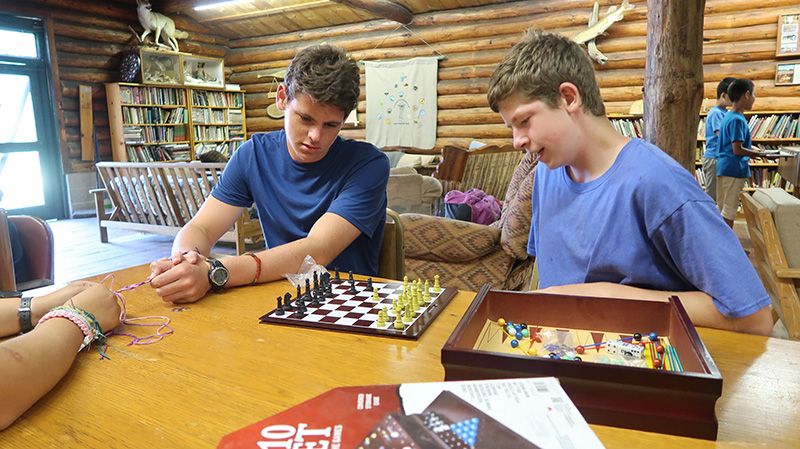Sleepaway Camps
Once you've made the decision to send your child to an overnight camp, the next step is to find and choose the right program. With over 5,000 summer camps in the United States, this can be a daunting task, but one that can be fun when you plan your search. the key here is to match your child's needs and desires with the program of the camp. It's impossible for one camp fits every child's needs. So even with in a family different camps might be required.
First take a few minutes to review the previous chapter and prioritize the areas of importance for your child. Then review these with your child.
When to Start
Ideally, you should start searching for a camp at least a full year before you plan to enroll your child. This gives you the chance to visit the camps that you are considering while they are in session. This gives you an opportunity to not only view the camp facilities, but also the campers, giving you a chance to get a feel for the program and its personality. Another bonus, often camps have a discount for enrolling early. Most of us are not that organized so, if you don't begin your search the summer before, don't lose hope. You should start by late fall or early winter. Some popular camps fill up quickly and may be full by this time but keep searching, you will find the right program.
How to Start
Even if you think that you have already decided, it is always a good choice to take a look at other programs before making a commitment, so that you can compare different programs. Some ways to find camps include: Word of Mouth, Churches or Synagogues, Library, Newspapers & Magazines, Local Camp Fairs and Private Camp Adviser's. However the most popular theses days is the web. By going to your search engine and typing the summer camp plus the state a huge array of camp listings will show up. You can also get info from camp directories, which have many camps listed and a short overview of each camp. However, one of the best is American Camp Association at http://campparents.org.
The Camp Video
It is important to have a goal in mind a check list of what your looking for in a summer camp experience. With that in hand start your search and use a check list to help narrow down your search. Once you have narrowed your search to four or five possibilities, call or e-mail the camp to ask for information. In addition to printed materials, most private camps also have a promotional video. Understand that these videos are promotional tools, but they will give you a visual image of the camp and the children.
You should view the camp video with your child, and let him take the lead when you discuss it. This will give you a good idea about what is important in a camp to your child. Make sure to explain to your child that the videos are advertisements and that the reality may not always match what you see on the screen.
When you watch the video, pay attention for clues about the camp's philosophy and strengths. While you're watching, look for:
-
How old is the video? If there is no date, then estimate the age based on the campers' clothing and the background music. No matter how recent the video is, you should ask the director what has changed or been added to the program since its filming.
-
Does the video answer your questions about the camp? While there should be additional questions that you want to ask the director, the video should give you a comprehensive overview.
-
What does the video emphasize? Pay attention to what activities and facilities get the most time in the video.
-
Do the kids look like they're having fun? What activities are they doing, and would your child enjoy them?
-
What level of sports were shown? If you're looking for a specialty sports camp, does the level of play look too advanced or too basic?
-
What did the video stress? Does the video seem to complement the philosophies expressed in the camp's printed materials?
-
What was your and your child's general impression after watching? Sometimes a gut instinct may tell you the most.
On-site Visits
Most families can not make a journey to camp while they are in session. But if you can, you will learn the most through direct observation and conversations. Call ahead for an appointment to make sure that you can visit on a day where you can see the program in action. The director may ask you to choose another day if your first choice falls when many campers would be off camp, or during visiting day or between sessions. If you can, review the camp's promotional materials before the visit.
You should leave at least two to three hours to spend at the camp so that you will have time to tour, observe, and chat. Observing activities for an extended period will give you a chance to see how the counselors juggle the demands of campers and to observe the safety precautions that are taken. At a visit, you should observe not only the facilities and the settings, but also how the administration and the staff are in action. If your child is with you on the tour, pay attention to how the tour guide interacts with and includes your child. How the guide interacts with your child reveals a lot about the camp's attitude and relationship with children.
 The camp director may or may not be the tour guide, but you should make sure to meet him or her before you leave. You need to know if the director is someone that you can trust to take care of your child for the summer. Is the director a hands-on administrator, or does he or she spend more time in the office with paper work? Does the director know the names of most of the children that you meet? Where is the director's on-camp residence?
The camp director may or may not be the tour guide, but you should make sure to meet him or her before you leave. You need to know if the director is someone that you can trust to take care of your child for the summer. Is the director a hands-on administrator, or does he or she spend more time in the office with paper work? Does the director know the names of most of the children that you meet? Where is the director's on-camp residence?
If the counselors aren't kind, caring, sensitive, imaginative, and skilled, then the facilities and activities don't matter. Counselors are directly responsible for making sure your child has a safe and fun summer. Pay attention to how the counselors interact with campers. During activities, counselors should be supervising and interacting with the campers, rather than chatting amongst themselves. Praise should be given to all children in activities, not just the superstars, and praise should be specific. Make sure that the specialty counselors are not just skilled themselves, but also great teachers who can translate their enthusiasm and skills to children.
Things to Consider
Weather you are going on a camp visit or are just watching a video and flipping through the brochure it is important to take note of many area that may affect your child's stay at camp. If an area is a top priority for your child and you can not find the information be sure to call the camp Director and ask questions.
Facilities
Take careful note of the condition of the facilities. Are the buildings well maintained, or do they show clear signs of a lack of maintenance. Though well worn and rustic buildings are perfectly ok, make sure that they are not being neglected. Specific things you'll want to look for and ask about include:
Bunks:
-
Are they in cabins, tents, or dorms?
-
How many beds are in each bunk?
-
Are the beds individual cots or bunk beds?
-
Do the campers choose which beds they want? What if they don't want a top bunk?
-
Where do the campers store their belongings?
-
Are the bunks crowded? Is there enough storage space? Does it look like the camp has overbooked and crowded extra campers in?
-
How clean are the bunks? Beds should be made by the campers and belongings should be in cubbies.
-
Where do the counselors sleep? How many counselors sleep in each bunk?
Bathrooms:
-
Where are the toilets? Does each bunk have it's own toilets or is there a common bathhouse?
-
If there is a common bathhouse, do children have to walk alone at night? Is the path lighted?
-
Are there showers in each bunk?
-
Do campers have to walk in their bathrobes/pajamas to the showers?
-
If the camp is coed, how separate are the shower facilities?
-
Who cleans the facilities, and how often?
 Waterfront or Swimming Pool:
Waterfront or Swimming Pool:
- Is the pool large enough to accommodate all swimmers?
- Are the waterfront areas for swimming, boating, water skiing and diving separate and clearly marked?
- What kind of waterfront equipment is provided?
- What is the level of waterfront supervision and ratio of lifeguards to swimmers?
- Are life jackets always worn during water sports?
- Are swimming areas clearly marked?
- How do they account for swimmers? Buddy board?
The Grounds:
- Are playing fields freshly reseeded and mowed?
- Are the trails clearly marked?
- Is the equipment in good condition?
Dinning Hall:
This is one of the most important areas in camp. Your child will spend 2-3 hours a day in the Dinning Hall. So make sure the Camp Directors understand this and work to make it a clean, exciting and nutritious experience Their are an increasing amount of dietary option and allergy that camps are dealing with. If you have special dietary needs don't be forget to make sure they can accommodate you
- Is there enough space for the whole camp to be served in one seating?
- Do cabins eat together? After all, this is your child's best friends.
- Are meals buffet style or are campers served? If they are served, who serves the food?
- What if the camper doesn't like the main selection? Are there alternatives? Is there a salad bar?
- Are snacks served? Is there a canteen/camp store?
- What is a typical menu for breakfast, lunch, and dinner?
- Who is the kitchen director and what are his or her credentials?
- What are the safety and cleanliness standards? Is the kitchen inspected by local authorities?
Arts & Crafts
Some camps use arts & crafts as a filler others use it as a place to expand creativity. if this is an area that you want your child to grow at. thick about this:
- Is there sufficient seating for every camper?
- What are the projects?
- Is the emphasis placed on learning the skill or on the end product?
- Are there enough supplies and tools so that many campers can participate at once?
- Are crafts projects cookie-cutter duplicates or is creativity and imagination encouraged?
- Are there special costs associated with projects/
- Are these just the same old projects your child has done before? Is there something new like pottery, stained glass or even nature art?
 Safety
Safety
While you want your child to have fun at camp, it is important that safety practices are interwoven into all parts of the camp program and facilities. Safety measures should dictate how programs are run and how the camp is laid out. Generally speaking if a camp is A.C.A. accredited you should feel comfortable knowing that that camp has passed a rigorous inspection process. You may want to note:
- Are there smoke alarms in every bunk and building? Does the camp hold fire drills? Where is the local fire department?
- Is a list of safety regulations clearly posted for each activity? Do counselors review safety practices with campers before starting?
- Is protective equipment worn for sports? Counselors should wear protective equipment as well to serve as role models for safety.
- Are there warm-up and cool down exercises for sports activities to reduce injury?
- Is there a higher counselor to camper ratio for activities with more safety concerns such as ropes courses, waterfront, riflery, archery, and gymnastics?
- At the waterfront, is there a buddy system with frequent buddy checks? Is there are controlled but fun atmosphere during free swim? Is the diving area monitored closely? What kind of swim tests are given?
- Are playing fields at a distance from normal camp traffic? Where are archery and riflery ranges located?
- On ropes courses, how are harnesses used and supported to hold the climbers?
- For gymnasts, are there spotters and protective mats at all activities?
- For horseback riders, who is in charge of riding instruction? Who gives the horses daily care and maintains the barn, stalls, and riding equipment? Do campers and staff wear protective helmets when riding?
House Calls
If you do not have the opportunity to visit the camp yourself, you can have the camp can come to you. The director or another representative of the camp may visit your home to discuss the program and answer your questions. Sometimes the director will ask if he can combine the visit with another family or two. If possible, ask that your visit is one on one. This gives a chance for you and your child to get to know the person who will be responsible for your child for the summer. With a one on one visit, you have the time and privacy to see how the director interacts with your child and the freedom to ask any and all of the questions you and your child may have. If a combined visit is a must, ask for some time alone with the director to discuss personal issues.
After a brief presentation about the camp, and a showing of the camp video, if you have not already seen it, the camp director will ask you for questions. The director should answer your questions clearly and in detail. A director who can't do this may not be a 'hands-on' director. You want to know that the director really knows the camp, program, and the community. Some areas that you should cover include:
The Numbers:
What is the counselor to camper ratio? The American Camp Association recommends a counselor to camper ratio of 1 to 6 for six to eight year olds, 1 to 8 for nine to fourteen year olds, and 1 to 10 for 15 to 18 year olds.
- How many campers and counselors are in each cabin?
- What is the instructor to camper ratio for skills classes like swimming, tennis, and riding?
- How many counselors accompany campers on off-site trips?
 Who's in Charge:
Who's in Charge:
Ask who runs the camp on a daily basis. Find out about the background and credentials of the camp director. Ask about how long the director has been at the camp. Ask if the camp is accredited by the American Camp Association, which is an independent organization that reviews camps on standards affecting safety, management, personnel, programming and facilities. Accreditation is voluntary. If the camp is not accredited, ask why. Make sure that even with an accredited camp, you make sure that the program is right for your child and that you do a reference check.
The Counseling Staff
The counselors can make or break a good camp program, so how the director staffs the program is critical. You should ask about:
- Where does the director recruit his counselors? Many camps recruit from college campuses, but some also recruit overseas. This can add to cultural diversity, but also can change the dynamics for either better or worse because of cultural differences.
- How is the counseling staff organized? Who supervises bunk counselors? Are regular meetings held and what is discussed?
- What are the credentials of specialists? Do they have other responsibilities?
- How many counselors are former campers?
- How many counselors are returning from the previous season?
- How many under-18 counselors will be supervising campers? Junior counselors and counselors-in-training should also be under the direct supervision of a more mature counselor and should not be counted as part of the staff to camper ratio.
- What kind of background check is run on counselors?
- What kind of training program are counselors required to complete?
Medical Issues
You should certainly discuss any special medical issues that your child has, but you should also know about the general medical care that your child will have at camp. Most camps are able to dispense routine medications, from prescriptions to allergy shots. Camps also generally have an established relationship with a local dentist and orthodontist for routine and emergency visits. You should also ask:
- What are the credentials of the camp medical staff? How long have they been affiliated with the camp?
- Of the medical staff, who stays on site? During what hours are children seen? Who stays with a child who is in the infirmary?
- Who is admitted to the infirmary and how long can a camper stay there?
- Are parents notified if their child is ill or only if they are admitted to the infirmary or taken to the local hospital?
- Where is the closest medical facility and how are campers transported there?
- How does the camp treat contagious diseases (colds, head lice, pink eye)?
- Do the camp fees include medical insurance? How does the camp handle health insurance in the event that a child needs to be taken to the hospital?
The Camp Program
You should review the camps daily schedule with the director. Make sure to ask about or note:
- What times do children get up in the morning?
- When are meals, snacks, and camp store times?
- What is the rainy day program? What if it rains for several days continuously?
- Does the camp conduct religious services? Is attendance compulsory?
- Ask the director to rate the level of competition at camp on a scale of 1 to 10. Are noncompetitive sports played?
- Are there inter-camp teams? How are members of those teams chosen?
- Are there special weekly or session events such as campfires, cookouts, sleepouts, or trips?
- Ask the director to describe how all-camp events, such as color war, are run.
- Is there downtime built into the schedule?
Camp Adjustment
Especially if it is your camper's first time at a sleepaway camp, you will want to know how the staff handles the adjustment to camp. How is loneliness and homesickness handled? Inquire about the camp policy on telephone contact. Some camps prohibit all calls for campers, others permit calls after a week at camp, while others have unlimited access. Others may allow calls only on birthdays or during visiting days if parents can't come to camp. Ask about visiting days and the program during those days. Are siblings allowed to visit? Can campers leave camp?
Cost of Camp
Be sure to ask the director about the actual, total cost of the camp. This should include not only tuition, but transportation, canteen and spending money, laundry, off-site trips, and uniforms, if required. Ask the director about how much of a deposit is required and if it is refundable? When must the camp fees be paid in full by? Ask about what the policy is if the family's plans change and they withdraw the child from the program before the start of camp. What if problems arise during camp and the child must come home?
References
An important part of selecting a camp should be checking references. Ask the director for the names and phone numbers of families whose children attended camp the previous summer. When you call, ask:
- How did the camp handle any homesickness issues?
- Was the program varied and interesting?
- How involved was the director in the day-to-day running of the camp? If he wasn't directly involved, who was? How did this impact the campers?
- How well supervised and interesting were any camp trips?
- Did the camper have any experience with the camp medical staff? Were they satisfied?
- Why did they choose this camp, and are they planning for their child to return?
- What age group is perfect for this camp and why?
Though choosing a sleepaway camp is a time-consuming process, it is worth the effort when you get the result that you want.

